(également disponibles dans la collection HAL-IFPEN "Les Cahiers de l’Économie”)
Archives : 2022 | 2021 | 2020 | 2019 | 2018 | 2017 | 2016 | 2015 | 2014 | 2013 | 2012 | 2011 | 2010
2022
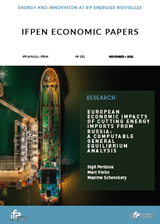 European Economic impacts of cutting energy imports from Russia: a computable general equilibrium analysis
European Economic impacts of cutting energy imports from Russia: a computable general equilibrium analysis
N° 151 – Novembre 2022 [ RECHERCHE ]
Sigit Perdana, Marc Vielle, Maxime Schenckery
The recent economic sanctions against Russia can jeopardize the sustainability of the European Union’s (EU) energy supply. Despite the EU’s strong commitment to stringent abatement targets, fossil fuels still play a significant role in the EU energy policy. Furthermore, high dependency on Russian energy supplies underlines the vulnerability of the EU energy security. Using a global computable general equilibrium model, we prove that the current EU embargo on coal and oil imported from Russia will have adverse supply effects, substantially increasing energy prices and welfare costs for the EU resident.
![]() Lire la suite / Télécharger le numéro (PDF - 6.4 Mo)
Lire la suite / Télécharger le numéro (PDF - 6.4 Mo) ![]()
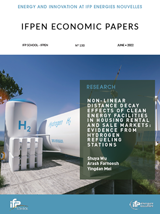 Non-linear distance decay effects of clean energy facilities in housing rental and sale markets: Evidence from hydrogen refueling stations
Non-linear distance decay effects of clean energy facilities in housing rental and sale markets: Evidence from hydrogen refueling stations
N° 150 – Juin 2022 [ RECHERCHE ]
Shuya Wu, Arash Farnoosh, Yingdan Mei
While promoting green and low-carbon transition, clean energy facilities also have externalities, which may lead to opposition and economic losses. There is evidence that the impact of facilities decreases with distance, but existing research make strict assumption on its functional form. In this research work we explore the non-linear relationship between housing transaction prices and distances to the nearest facility without predefined functions combined with spatial smoothing in the hedonic pricing model by taking China as a case-study.
![]() Lire la suite / Télécharger le numéro (PDF - 2.6 Mo)
Lire la suite / Télécharger le numéro (PDF - 2.6 Mo) ![]()
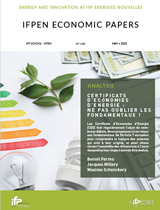 Certificats d’Economies d’Energie : ne pas oublier les fondamentaux !
Certificats d’Economies d’Energie : ne pas oublier les fondamentaux !
Numéro 149 - Mai 2022 [ ANALYSE ]
Benoit Ferres, Jacques Millery, Maxime Schenckery
Les Certificats d’Economies d’Energie, CEE font régulièrement l’objet de nombreux débats. Nous proposons ici un retour aux fondamentaux de l’Article 7 européen pour comprendre la logique des attentes qui sont à leur origine, et ainsi mieux cerner l’ensemble des dimensions à l’aune desquelles leur impact devrait être évalué.
![]() Lire la suite / Télécharger le numéro (PDF - 2.6 Mo)
Lire la suite / Télécharger le numéro (PDF - 2.6 Mo) ![]()
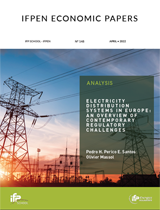 Electricity Distribution Systems in Europe: An Overview of Contemporary Regulatory Challenges
Electricity Distribution Systems in Europe: An Overview of Contemporary Regulatory Challenges
Numéro 148 - Avril 2022 [ ANALYSE ]
Pedro H. Perico E Santos, Olivier Massol
In Europe, a significant adaptation of the existing power distribution sector is necessary to support the transition toward low-carbon energy systems and facilitate the massive deployment of low-carbon distributed power technologies. This report first examines the current organization of that industry and highlights the country-specific and diverse nature of the industry structures and the institutional organizations governing the distribution sector.
![]() Lire la suite / Télécharger le numéro (PDF - 3.2 Mo)
Lire la suite / Télécharger le numéro (PDF - 3.2 Mo) ![]()
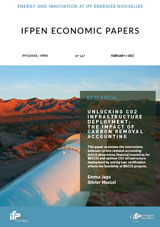 Unlocking CO2 infrastructure deployment: the impact of carbon removal accounting
Unlocking CO2 infrastructure deployment: the impact of carbon removal accounting
N° 147 – Février 2022 [ RECHERCHE ]
Emma Jagu, Olivier Massol
This paper examines the interactions between carbon removal accounting (which determines financial incentives for BECCS) and optimal CO2 infrastructure deployment by asking how certification affects the feasibility of BECCS projects.
![]() Lire la suite / Télécharger le numéro (PDF - 3.7 Mo)
Lire la suite / Télécharger le numéro (PDF - 3.7 Mo) ![]()
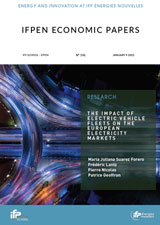 The impact of Electric Vehicle fleets on the European electricity markets: evidences from the German passenger car fleet and power generation sector
The impact of Electric Vehicle fleets on the European electricity markets: evidences from the German passenger car fleet and power generation sector
N° 146 – Janvier 2022 [ RECHERCHE ]
Maria Juliana Suarez Forero, Frédéric Lantz, Pierre Nicolas, Patrice Geoffron
The rapidly increasing participation of renewable energies (REn) into the electric mix, clearly traces the trends for the decarbonization goals in the European Union. Under the priority sale conditions established by governments, the commercialization of REn plays an important role in the consolidation of market prices, which are on a decreasing trend with large fluctuations that reduce the profit in the power sector and therefore, the interest of potential investors.
![]() Lire la suite / Télécharger le numéro (PDF -5.2 Mo)
Lire la suite / Télécharger le numéro (PDF -5.2 Mo) ![]()
2021
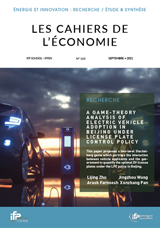 A Game-theory Analysis of Electric Vehicle Adoption in Beijing under License Plate Control Policy
A Game-theory Analysis of Electric Vehicle Adoption in Beijing under License Plate Control Policy
Numéro 145 – Septembre 2021
Lijing Zhu, Jingzhou Wang, Arash Farnoosh, Xunzhang Pan
This paper proposes a two-level Stackelberg game which portrays the interaction between vehicle applicants and the government to quantify the optimal EV license plates under the LPC policy in Beijing.
![]() Lire la suite / Télécharger le numéro (PDF - 1.6 Mo)
Lire la suite / Télécharger le numéro (PDF - 1.6 Mo) ![]()
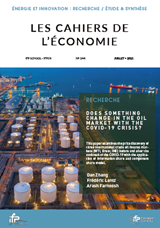 Does something change in the oil market with the COVID-19 crisis?
Does something change in the oil market with the COVID-19 crisis?
Numéro 144 – Juillet 2021
Dan Zhang, Frédéric Lantz, Arash Farnoosh
This paper examines the price discovery of three international crude oil futures markets (WTI, Brent, INE) before and after the outbreak of the COVID-19 with the application of information share and component share model.
![]() Lire la suite / Télécharger le numéro (PDF - 3.9 Mo)
Lire la suite / Télécharger le numéro (PDF - 3.9 Mo) ![]()
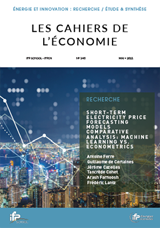 Short-term electricity price forecasting models comparative analysis: Machine Learning vs. Econometrics
Short-term electricity price forecasting models comparative analysis: Machine Learning vs. Econometrics
Numéro 143 – Mai 2021
Antoine Ferre, Guillaume de Certaines, Jérôme Cazelles, Tancrède Cohet, Arash Farnoosh, Frédéric Lantz
This paper gives an overview of several models applied to forecast the day-ahead prices of the German electricity market between 2014 and 2015 using hourly wind and solar productions as well as load.
![]() Lire la suite / Télécharger le numéro (PDF - 5.8 Mo)
Lire la suite / Télécharger le numéro (PDF - 5.8 Mo) ![]()
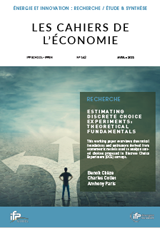 Estimating discrete choice experiments: theoretical fundamentals
Estimating discrete choice experiments: theoretical fundamentals
Numéro 142 – Avril 2021
Benoît Chèze, Charles Collet, and Anthony Paris
This working paper overviews theoretical foundations and estimators derived from econometric models used to analyze stated choices proposed in Discrete Choice Experiment (DCE) surveys.
![]() Lire la suite / Télécharger le numéro (PDF - 2 Mo)
Lire la suite / Télécharger le numéro (PDF - 2 Mo) ![]()
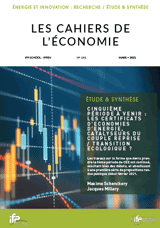 Cinquième période à venir : les Certificats d’Economies d’Energie, catalyseurs du couple Reprise / Transition Ecologique ?
Cinquième période à venir : les Certificats d’Economies d’Energie, catalyseurs du couple Reprise / Transition Ecologique ?
Numéro 141 - Mars 2021 [ ÉTUDE & SYNTHÈSE ]
Maxime Schenckery, Jacques Millery
Les travaux sur la forme que devra prendre la 5ème période de CEE ont continué, suscitant bien des débats, et aboutissant à une première série de propositions rendue publique début février 2021.
![]() Lire la suite / Télécharger le numéro (PDF - 1 Mo)
Lire la suite / Télécharger le numéro (PDF - 1 Mo) ![]()
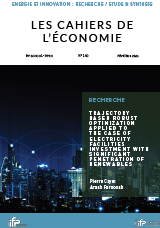 Trajectory Based Robust Optimization Applied to the Case of Electricity Facilities Investment with Significant Penetration of Renewables
Trajectory Based Robust Optimization Applied to the Case of Electricity Facilities Investment with Significant Penetration of Renewables
Numéro 140 – Février 2021
Pierre Cayet, Arash Farnoosh
As large scale penetration of renewables into electric systems requires increasing flexibility from dispatchable production units, the electricity mix must be designed in order to address brutal variations of residual demand. Inspired from the philosophy of Distributionally Robust Optimization (DRO), we propose a trajectory ambiguity set including residual demand trajectories verifying both support and variability criterion using ambiguous quantile information.
![]() Lire la suite / Télécharger le numéro (PDF - 4.2 Mo)
Lire la suite / Télécharger le numéro (PDF - 4.2 Mo) ![]()
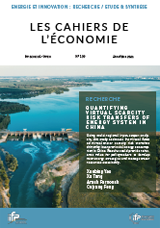 Quantifying virtual water scarcity risk transfers of energy system in China
Quantifying virtual water scarcity risk transfers of energy system in China
Numéro 139 – Janvier 2021
Xuebing Yao, Xu Tang, Arash Farnoosh, Cuiyang Feng
Using multi-regional input-output analysis, this study estimates the virtual flows ad virtual water scarcity risk transfers driven by interprovincial energy consumption in China. Results could provide reference value for policymakers to develop new energy strategies and manage water resources sustainably.
![]() Lire la suite / Télécharger le numéro (PDF - 3,8 Mo)
Lire la suite / Télécharger le numéro (PDF - 3,8 Mo) ![]()
2020
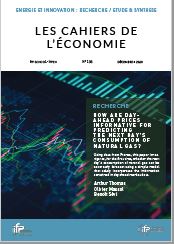 How are day-ahead prices informative for predicting the next day’s consumption of natural gas?
How are day-ahead prices informative for predicting the next day’s consumption of natural gas?
Numéro 138 – Décembre 2020
Arthur Thomas, Olivier Massol, Benoît Sévi
Using data from France, this paper investigates, for the first time, whether the next day’s consumption of natural gas can be accurately forecast using a simple model that solely incorporates the information contained in dayahead market data.
![]() Lire la suite / Télécharger le numéro (PDF - 1,8 Mo)
Lire la suite / Télécharger le numéro (PDF - 1,8 Mo) ![]()
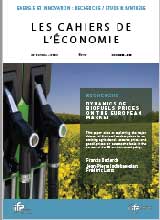 Dynamics of biofuel prices on the European market
Dynamics of biofuel prices on the European market
Numéro 137 – Novembre 2020
Francis Declerck, Jean-Pierre Indjehagopian, Frédéric Lantz
This paper aims at explaining the major drivers of biodiesel market prices by examining agricultural resource prices and gasoil prices for automotive fuels in the context of the EU environmental policy.
![]() Lire la suite / Télécharger le numéro (PDF - 4 Mo)
Lire la suite / Télécharger le numéro (PDF - 4 Mo) ![]()
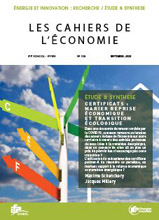 Certificats : marier reprise économique et transition écologique
Certificats : marier reprise économique et transition écologique
Numéro 136 - Septembre 2020 [ ÉTUDE & SYNTHÈSE ]
Maxime Schenckery, Jacques Millery
Dans une économie durement touchée par la Covid-19, comment remettre en fonction des acteurs de base de l’économie sur notre territoire à travers des activités porteuses de sens liées à la transition énergétique, dans un contexte de crise où en plus un prix du pétrole bas n’encourage pas cette transition ?
L’utilisation du mécanisme des certificats permet-il de résoudre ce paradoxe, en mariant support à la relance économique et transition énergétique ?
![]() Lire la suite / Télécharger le numéro (PDF - 3,1 Mo)
Lire la suite / Télécharger le numéro (PDF - 3,1 Mo) ![]()
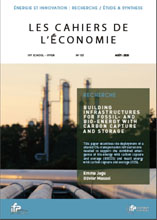 Building infrastructures for Fossil- and Bio-energy with Carbon Capture and Storage: insights from a cooperative game-theoretic perspective
Building infrastructures for Fossil- and Bio-energy with Carbon Capture and Storage: insights from a cooperative game-theoretic perspective
Numéro 135 - Août 2020
Emma Jagu, Olivier Massol
This paper examines the deployment of a shared CO2 transportation infrastructure needed to support the combined emergence of bio-energy with carbon capture and storage (BECCS) and fossil energy with carbon capture and storage (CCS).
![]() Lire la suite / Télécharger le numéro (PDF - 1,9 Mo)
Lire la suite / Télécharger le numéro (PDF - 1,9 Mo) ![]()
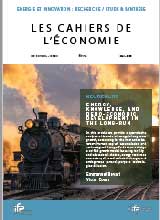 Energy, Knowledge, and Demo-Economic Development in the Long Run
Energy, Knowledge, and Demo-Economic Development in the Long Run
Numéro 134 – Mai 2020
Emmanuel Bovari, Victor Court
In this article we provide a quantitative analysis of the role of energy in long-term growth, accounting for the interaction between human capital accumulation and technological change. To do so, we design a unified growth model featuring fertility and educational choices, energy resources extraction, directed technical change, and endogenous general purpose technologies diffusion.
![]() Lire la suite / Télécharger le numéro (PDF – 3,5 Mo)
Lire la suite / Télécharger le numéro (PDF – 3,5 Mo) ![]()
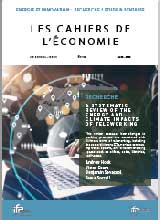 A systematic review of the energy and climate impacts of teleworking
A systematic review of the energy and climate impacts of teleworking
Numéro 133 – Mars 2020
Andrew Hook, Victor Court, Benjamin Sovacool, Steve Sorrell
This review assesses how changes in working practices are associated with different forms of teleworking, including the use of different ICTs, various commuting/travel options, and different working spaces such as offices, cafes, libraries, and homes.
![]() Lire la suite / Télécharger le numéro (PDF – 1,8 Mo)
Lire la suite / Télécharger le numéro (PDF – 1,8 Mo) ![]()
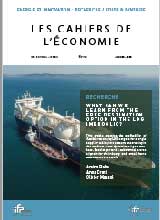 What can be learned from the free destination option in the LNG imbroglio?
What can be learned from the free destination option in the LNG imbroglio?
Numéro 132 – Janvier 2020
Amina Baba, Anna Creti, Olivier Massol
This article examine the profitability of flexible routing by LNG cargoes for a single supplier taking into account uncertainty in the medium-term dynamics of gas markets. Results portend a substantial source of profit for the industry and reveal future movements of vessels.
![]() Lire la suite / Télécharger le numéro (PDF – 3 Mo)
Lire la suite / Télécharger le numéro (PDF – 3 Mo) ![]()
2019
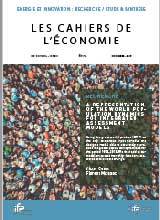 A Representation of the World Population Dynamics for Integrated Assessments Models
A Representation of the World Population Dynamics for Integrated Assessments Models
Numéro 131 – Novembre 2019
Victor Court, Florent McIsaac
Using the gross world product (GWP) as the only exogenous input variable, we design a model able to accurately reproduce the global population dynamics over the period 1950–2015. We then add to our model an excess mortality function associated with climate change.
![]() Lire la suite / Télécharger le numéro (PDF - 8 Mo)
Lire la suite / Télécharger le numéro (PDF - 8 Mo) ![]()
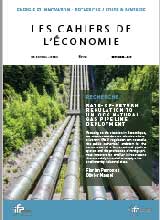 Rate-of-return regulation to unlock natural gas pipeline deployment
Rate-of-return regulation to unlock natural gas pipeline deployment
Numéro 130 – Septembre 2019
Florian Perrotton, Olivier Massol
Focusing on the situation in Mozambique, we examine whether the adoption of rate-of-return (RoR) regulation can reconcile the public authorities’ ambition for the construction of a large national pipeline system and the preference of foreign private investors for smaller infrastructure that are solely intended to supply a few creditworthy industrial sites.
![]() Lire la suite / Télécharger le numéro (PDF - 5.1 Mo)
Lire la suite / Télécharger le numéro (PDF - 5.1 Mo) ![]()
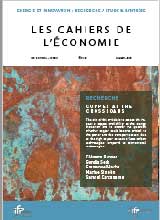 Copper at the Crossroads
Copper at the Crossroads
Numéro 129 – Juillet 2019
Clément Bonnet, Gondia Seck, Emmanuel Hache, Marine Simoën, Samuel Carcanague
The aim of this article is to assess the impact of copper availability on the energy transition and to answer the question whether copper could become critical to the power and the transport sectors due to the high copper content of low-carbon technologies compared to conventional technologies.
![]() Lire la suite / Télécharger le numéro (PDF - 7.7 Mo)
Lire la suite / Télécharger le numéro (PDF - 7.7 Mo) ![]()
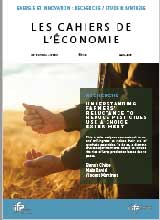 Understanding farmers’ reluctance to reduce pesticide use: A choice experiment
Understanding farmers’ reluctance to reduce pesticide use: A choice experiment
Numéro 128 – Juin 2019
Benoît Chèze, Maïa David, Vincent Martinet
This article analyzes conventional farmers’ willingness to reduce their use of synthetic pesticides. To do so, a discrete choice experiment was design to include the risk of large production losses due to pests.
![]() Lire la suite / Télécharger le numéro (PDF - 5 Mo)
Lire la suite / Télécharger le numéro (PDF - 5 Mo) ![]()
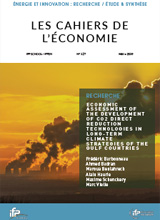 Economic Assessment of the Development of CO2 Direct Reduction Technologies in Long-term Climate Strategies of the Gulf Countries
Economic Assessment of the Development of CO2 Direct Reduction Technologies in Long-term Climate Strategies of the Gulf Countries
Numéro 127 – Mai 2019
Frédéric Barbonneau, Ahmed Badran, Maroua Benlahrech, Alain Haurie, Maxime Schenckery, Marc Vielle
In this paper, we explore the long-term options offered to GCC countries by Carbon Capture and Storage (CCS) and Carbon Dioxide Removal (CDR) technologies in the negotiations for a fair burden sharing of Paris agreement objectives.
![]() Lire la suite / Télécharger le numéro (PDF - 2.5 Mo)
Lire la suite / Télécharger le numéro (PDF - 2.5 Mo) ![]()
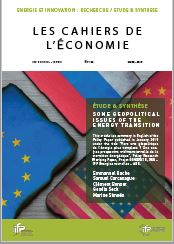 Some Geopolitical Issues of the Energy Transition
Some Geopolitical Issues of the Energy Transition
Numéro 126 – Mars 2019 [ ÉTUDE & SYNTHÈSE ]
Emmanuel Hache, Samuel Carcanague, Clément Bonnet, Gondia Seck, Marine Simoën
This article is a summary in English of the Policy Paper published in January 2019 under the title “Vers une géopolitique de l’énergie plus complexe ? Une analyse prospective tridimensionnelle de la transition énergétique”, Policy Research Working Paper, Projet GENERATE, IRIS – IFP Energies nouvelles – ANR.
![]() Lire la suite / Télécharger le numéro (PDF - 7.5 Mo)
Lire la suite / Télécharger le numéro (PDF - 7.5 Mo) ![]()
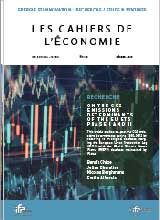 On the CO2 emissions determinants of the EU ETS Phases I and II
On the CO2 emissions determinants of the EU ETS Phases I and II
Numéro 125 – Février 2019
Benoît Chèze, Julien Chevalier, Nicolas Berghmans, Emilie Alberola
This article studies ex-post the CO2 emissions determinants during 2005-2012 by resorting to an original database merging the European Union Transaction Log (EUTL) with the World Electric Power Plants (WEPP) database maintained by Platts.
![]() Lire la suite / Télécharger le numéro (PDF - 3.9 Mo)
Lire la suite / Télécharger le numéro (PDF - 3.9 Mo) ![]()
2018
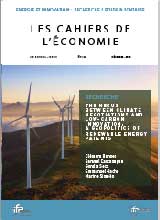 The Nexus Between Climate Negotiations and Low-Carbon Innovation :A Geopolitics of Renewable Energy Patents
The Nexus Between Climate Negotiations and Low-Carbon Innovation :A Geopolitics of Renewable Energy Patents
Numéro 124 – Décembre 2018
Clément Bonnet, Samuel Carcanague, Gondia Seck, Emmanuel Hache, Marine Simoën
Intellectual property is a central issue in the climate negotiations. On the one hand, it shapes and encourages innovation in low‐carbon technologies. On the other hand, it reduces access to these technologies by giving patent holders market power. We analyze the interactions between climate negotiations and the acquisition of patents on renewable energy technologies.
![]() Lire la suite / Télécharger le numéro (PDF - 4.2 Mo)
Lire la suite / Télécharger le numéro (PDF - 4.2 Mo) ![]()
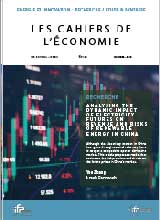 Analyzing the Dynamic Impact of Electricity Futures on Revenue and Risk of Renewable Energy in China
Analyzing the Dynamic Impact of Electricity Futures on Revenue and Risk of Renewable Energy in China
Numéro 123 – Octobre 2018
Yue Zhang, Arash Farnoosh
Although the electricity market in China has gone through several reforms, there is not yet a competitive spot or derivative market. This article proposes a model that estimates the risk premium and simulates the future prices in China’s market.
![]() Lire la suite / Télécharger le numéro (PDF - 4 Mo)
Lire la suite / Télécharger le numéro (PDF - 4 Mo) ![]()
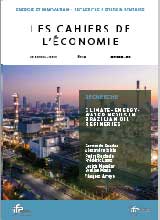 Climate-energy-water nexus in Brazilian oil refineries
Climate-energy-water nexus in Brazilian oil refineries
Numéro 122 – Septembre 2018
Fernanda Guedes, Alexandre Szklo, Pedro Rochedo, Frédéric Lantz, Leticia Magalar, Eveline Maria, Vásquez Arroyo
By simulating two parametric models, one for all Brazilian refineries, and the other locally detailing the water balance of the country´s largest refinery, this study aimed to quantify the impacts of CO2 mitigation options on the water use of oil refineries.
![]() Lire la suite / Télécharger le numéro (PDF - 4.5 Mo)
Lire la suite / Télécharger le numéro (PDF - 4.5 Mo) ![]()
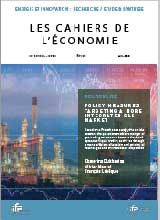 Policy measures targeting a more integrated gas market
Policy measures targeting a more integrated gas market
Numéro 121 – Juin 2018
Ekaterina Dukhanina, Olivier Massol, François Lévêque
Based on a French case study, this article answers the question whether a merger of gas trading zones contributes to the development of liquid trading activities through a more efficient allocation and pricing of natural gas and an increased competition.
![]() Lire la suite / Télécharger le numéro (PDF - 11.2 Mo)
Lire la suite / Télécharger le numéro (PDF - 11.2 Mo) ![]()
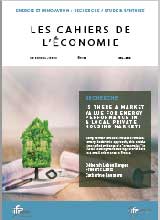 Is there a market value for energy performance in a local private housing market?
Is there a market value for energy performance in a local private housing market?
Numéro 120 – Avril 2018
Déborah Leboullenger, Frédéric Lantz, Catherine Baumont
Using frontier fonctions instead of the customary hedonistic approach, this article aims to find evidence of a “green value” in a local housing market using notarial data on a small urban area in France.
![]() Lire la suite / Télécharger le numéro (PDF - 5.2 Mo)
Lire la suite / Télécharger le numéro (PDF - 5.2 Mo) ![]()
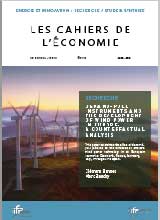 Demand-pull instruments and the development of wind power in Europe: a counterfactual analysis
Demand-pull instruments and the development of wind power in Europe: a counterfactual analysis
Numéro 119 – Mars 2018
Clément Bonnet, Marc Baudry
This paper examines the effect of demand-pull policies on the diffusion of onshore wind power technology in six European countries: Denmark, France, Germany, Italy, Portugal and Spain.
![]() Lire la suite / Télécharger le numéro (PDF - 2.2 Mo)
Lire la suite / Télécharger le numéro (PDF - 2.2 Mo) ![]()
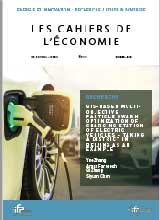 GIS-Based Multi-Objective Particle Swarm Optimization of Charging Station for Electric Vehicles – Taking a District in Beijing as an Example
GIS-Based Multi-Objective Particle Swarm Optimization of Charging Station for Electric Vehicles – Taking a District in Beijing as an Example
Numéro 118 – Février 2018
Yue Zhang, Arash Farnoosh, Qi Zhang, Siyuan Chen
The rapid development of electric vehicles can greatly alleviate the environmental problems and energy tension. However, the lack of public supporting facilities has become the biggest problem hinders its development.
![]() Lire la suite / Télécharger le numéro (PDF - 2.8 Mo)
Lire la suite / Télécharger le numéro (PDF - 2.8 Mo) ![]()
2017
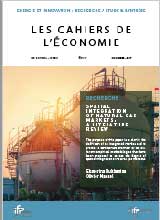 Spatial integration of natural gas markets: A literature review
Spatial integration of natural gas markets: A literature review
Numéro 117 – Novembre 2017
Ekaterina Dukhanina, Olivier Massol
The purpose of this paper is to clarify the definition of an integrated market and to provide a commented overview of the different empirical methodologies that have been proposed to assess the degree of spatial integration of natural gas markets.
![]() Lire la suite / Télécharger le numéro (PDF - 3 Mo)
Lire la suite / Télécharger le numéro (PDF - 3 Mo) ![]()
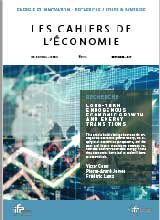 Long-term endogenous economic growth and energy transitions
Long-term endogenous economic growth and energy transitions
Numéro 116 – Septembre 2017
Victor Court, Pierre-André Jouvet, Frédéric Lantz
This article build a bridge between the endogenous economic growth theory, the biophysical economics perspective, and the past and future transitions between renewable and nonrenewable energy forms that economies have had to and will have to accomplish.
![]() Lire la suite / Télécharger le numéro (PDF - 4.2 Mo)
Lire la suite / Télécharger le numéro (PDF - 4.2 Mo) ![]()
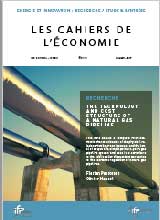 The technology and cost structure of a natural gas pipeline
The technology and cost structure of a natural gas pipeline
Numéro 115 – Juillet 2017
Florian Perrotton, Olivier Massol
This note details a complete microeconomic characterization of the physical relationships between input use and the level of output of a simple point-to-point gas pipeline system and uses it to contribute to the public policy discussions pertaining to the economic regulation of natural gas pipelines.
![]() Lire la suite / Télécharger le numéro (PDF - 1.5 Mo)
Lire la suite / Télécharger le numéro (PDF - 1.5 Mo) ![]()
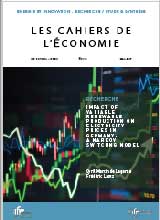 Impact of variable renewable production on electricity prices in Germany: a Markov Switching model
Impact of variable renewable production on electricity prices in Germany: a Markov Switching model
Numéro 114 – Mai 2017
Cyril Martin de Lagarde, Frédéric Lantz
This paper aims at assessing the impact of renewable energy sources (RES) production on electricity spot prices. To do so, we use a two-regime Markov Switching (MS) model, that enables to disentangle the so-called “merit-order effect” due to wind and solar photovoltaic productions (used in relative share of the electricity demand), depending on the price being high or low.
![]() Lire la suite / Télécharger le numéro (PDF - 5.2 Mo)
Lire la suite / Télécharger le numéro (PDF - 5.2 Mo) ![]()
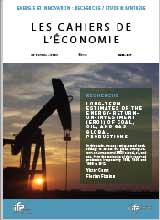 Long-term estimates of the energy-return-on-investment (EROI) of coal, oil, and gas global productions
Long-term estimates of the energy-return-on-investment (EROI) of coal, oil, and gas global productions
Numéro 113 – Mars 2017
Victor Court, Florian Fizaine
In this study, we use a price-based methodology to assess the global energy-return-on-investment (EROI) of coal, oil, and gas, from the beginning of their reported production (respectively 1800, 1860, and 1890) to 2012.
![]() Lire la suite / Télécharger le numéro (PDF - 2 Mo)
Lire la suite / Télécharger le numéro (PDF - 2 Mo) ![]()
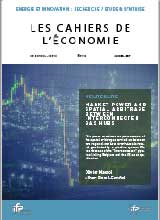 Market power and spatial arbitrage between interconnected gas hubs
Market power and spatial arbitrage between interconnected gas hubs
Numéro 112 – Janvier 2017
Olivier Massol, Albert Banal-Estañol
This paper examines the performance of the spatial arbitrages carried out between two regional markets for wholesale natural gas linked by a pipeline system. We use the case of the “Interconnector” pipeline linking Belgium and the UK as an application.
![]() Lire la suite / Télécharger le numéro (PDF - 3.4 Mo)
Lire la suite / Télécharger le numéro (PDF - 3.4 Mo) ![]()
2016
Numéro 111 - Septembre 2016
![]() Phasing out the U.S. Federal Helium Reserve: Policy insights from a world helium model (PDF - 2,26 Mo)
Phasing out the U.S. Federal Helium Reserve: Policy insights from a world helium model (PDF - 2,26 Mo)
Numéro 110 - Septembre 2016
![]() Energy transition in transportation under cost uncertainty, an assessment based on robust op...( PDF - 2,6 Mo)
Energy transition in transportation under cost uncertainty, an assessment based on robust op...( PDF - 2,6 Mo)
Numéro 109 - Septembre 2016
![]() Do renewable energies improve energy security in the long run? (PDF - 200 Ko)
Do renewable energies improve energy security in the long run? (PDF - 200 Ko)
Numéro 108 - Septembre 2016
![]() Robust Energy Transition Pathways for Global Warming Targets (PDF - 5 Mo)
Robust Energy Transition Pathways for Global Warming Targets (PDF - 5 Mo)
Numéro 107 - Juillet 2016
![]() The land use change time-accounting failure (PDF - 600 Ko)
The land use change time-accounting failure (PDF - 600 Ko)
Numéro 106 - Avril 2016
![]() Sanctions against Iran: An assessment of their global impact through the lens of international m... (en anglais, PDF - 600 Ko)
Sanctions against Iran: An assessment of their global impact through the lens of international m... (en anglais, PDF - 600 Ko)
Numéro 105 - Avril 2016
![]() On the economic optimization of national power generation mix in Iran: A Markowitz’ portfolio-... (en anglais, PDF - 4,2 Mo)
On the economic optimization of national power generation mix in Iran: A Markowitz’ portfolio-... (en anglais, PDF - 4,2 Mo)
Numéro 104 - Avril 2016
![]() The Effect of Biofuels on the Link between Oil and Agricultural Commodity Prices: A Smooth Trans... (en anglais, PDF - 750 Ko)
The Effect of Biofuels on the Link between Oil and Agricultural Commodity Prices: A Smooth Trans... (en anglais, PDF - 750 Ko)
Numéro 103 - Avril 2016
![]() Beyond average energy consumption in the French residential housing market: A household classifi... (en anglais, PDF - 1,8 Mo)
Beyond average energy consumption in the French residential housing market: A household classifi... (en anglais, PDF - 1,8 Mo)
Numéro 102 - Avril 2016
![]() Un nouveau cycle de fusions et acquisitions dans le secteur des hydrocarbures ? Une analyse éco... (PDF - 1 Mo)
Un nouveau cycle de fusions et acquisitions dans le secteur des hydrocarbures ? Une analyse éco... (PDF - 1 Mo)
2015
Numéro 101 - Juillet 2015
![]() Decarbonisation of electricity generation in an oil & gas producing country: "A sensitivity an... (en anglais, PDF - 1 Mo)
Decarbonisation of electricity generation in an oil & gas producing country: "A sensitivity an... (en anglais, PDF - 1 Mo)
Numéro 100 - Novembre 2015
![]() Incentives for early adoption of carbon capture technology: further considerations from a Eu... (en anglais, PDF - 3,82 Mo)
Incentives for early adoption of carbon capture technology: further considerations from a Eu... (en anglais, PDF - 3,82 Mo)
Numéro 99 - Juillet 2015
![]() On the link between oil price and exchange rate: A time-varying VAR parameter approach (en anglais, PDF - 1,72 Mo)
On the link between oil price and exchange rate: A time-varying VAR parameter approach (en anglais, PDF - 1,72 Mo)
2014
Numéro 98 - Octobre 2014
![]() (How) does sectoral detail affect the robustness of policy insights from energy system models?... (en anglais, PDF - 4,30 Mo)
(How) does sectoral detail affect the robustness of policy insights from energy system models?... (en anglais, PDF - 4,30 Mo)
Numéro 97 - Janvier 2014
![]() Market power across the Channel: Are Continental European gas markets isolated? (en anglais, PDF - 444 Ko)
Market power across the Channel: Are Continental European gas markets isolated? (en anglais, PDF - 444 Ko)
2013
Numéro 96 - Décembre 2013
![]() Second-best urban tolling with distributive concerns (en anglais, PDF - 570 Ko)
Second-best urban tolling with distributive concerns (en anglais, PDF - 570 Ko)
Numéro 95 - Décembre 2013
![]() The use of Meta-Regression Analysis to harmonize LCA literature: an application to GHG emissions of 2nd and 3rd generation biofuels (en anglais, PDF - 1,7 Mo)
The use of Meta-Regression Analysis to harmonize LCA literature: an application to GHG emissions of 2nd and 3rd generation biofuels (en anglais, PDF - 1,7 Mo)
Numéro 94 - Décembre 2013
![]() Will technological progress be sufficient to stabilize CO2 emissions from air transport in the mid-term? (en anglais, PDF - 712 Ko)
Will technological progress be sufficient to stabilize CO2 emissions from air transport in the mid-term? (en anglais, PDF - 712 Ko)
Numéro 93 - Décembre 2013
![]() On the link between oil and commodity prices: a panel VAR approach (en anglais, PDF - 340 Ko)
On the link between oil and commodity prices: a panel VAR approach (en anglais, PDF - 340 Ko)
Numéro 92 - Décembre 2013
![]() Electricity generation analyses in an oil-exporting country: Transition to non-fossil fuel based power units in Saudi Arabia (en anglais, PDF - 520 Ko)
Electricity generation analyses in an oil-exporting country: Transition to non-fossil fuel based power units in Saudi Arabia (en anglais, PDF - 520 Ko)
Numéro 91 - Novembre 2013
![]() Personal car, public transport and other alternatives? Predicting potential modal shifts from multinomial logit models and bootstrap confidence intervals (en anglais, PDF - 1,23 Mo)
Personal car, public transport and other alternatives? Predicting potential modal shifts from multinomial logit models and bootstrap confidence intervals (en anglais, PDF - 1,23 Mo)
Numéro 90 - Novembre 2013
![]() Lessons from the use of a long-term energy model for consequential life cycle assessment: the BTL case (en anglais, PDF - 7 Mo)
Lessons from the use of a long-term energy model for consequential life cycle assessment: the BTL case (en anglais, PDF - 7 Mo)
2012
Numéro 89 - Octobre 2012
![]() Joining the CCS Club! Insights from a Northwest European CO2 Pipeline Project (en anglais, PDF - 754 Ko)
Joining the CCS Club! Insights from a Northwest European CO2 Pipeline Project (en anglais, PDF - 754 Ko)
Numéro 88 - Septembre 2012
![]() Petroleum products price interactions on the world markets: an econometric analysis (en anglais, PDF - 419 Ko)
Petroleum products price interactions on the world markets: an econometric analysis (en anglais, PDF - 419 Ko)
Numéro 87 - Septembre 2012
![]() The French biofuels mandates under cost uncertainty - an assessment based on robust optimization (en anglais, PDF - 1 Mo)
The French biofuels mandates under cost uncertainty - an assessment based on robust optimization (en anglais, PDF - 1 Mo)
2011
Numéro 86 - Décembre 2011
![]() Air traffic energy efficiency differs from place to place: analysis of historical trends by geographical zones using a macro-level methodology (en anglais, PDF - 554 Ko)
Air traffic energy efficiency differs from place to place: analysis of historical trends by geographical zones using a macro-level methodology (en anglais, PDF - 554 Ko)
Numéro 85 - Décembre 2011
![]() Export diversification and resource-based industrialization: the case of natural gas (en anglais, PDF - 1 Mo)
Export diversification and resource-based industrialization: the case of natural gas (en anglais, PDF - 1 Mo)
Numéro 84 - Décembre 2011
![]() A generalized Nash-Cournot model for the north-western European natural gas markets with a fuel substitution demand function: the GaMMES model (en anglais, PDF - 1 Mo)
A generalized Nash-Cournot model for the north-western European natural gas markets with a fuel substitution demand function: the GaMMES model (en anglais, PDF - 1 Mo)
Numéro 83 - Décembre 2011
![]() Bioenergies usages in electricity generation utility means through a modelling approach: application to the French case (en anglais, PDF - 1 Mo)
Bioenergies usages in electricity generation utility means through a modelling approach: application to the French case (en anglais, PDF - 1 Mo)
Numéro 82 - Décembre 2011
![]() The bioenergies development: the role of biofuels and the CO2 price (en anglais, PDF - 812 Ko)
The bioenergies development: the role of biofuels and the CO2 price (en anglais, PDF - 812 Ko)
Numéro 81 - Avril 2011
![]() Construction of a fuel demand function portraying interfuel substitution, a system dynamics approach (en anglais, PDF - 1,5 Mo)
Construction of a fuel demand function portraying interfuel substitution, a system dynamics approach (en anglais, PDF - 1,5 Mo)
Numéro 80 - Avril 2011
![]() Oil price volatility: An Econometric Analysis of the WTI Market (en anglais, PDF - 0,3 Mo)
Oil price volatility: An Econometric Analysis of the WTI Market (en anglais, PDF - 0,3 Mo)
Numéro 79 - Avril 2011
![]() Security of supply and retail competition in the European gas market, some model-based insights (en anglais, PDF - 1,6 Mo)
Security of supply and retail competition in the European gas market, some model-based insights (en anglais, PDF - 1,6 Mo)
Numéro 78 - Mars 2011
![]() Does OPEC still exist as a cartel? An empirical investigation? (en anglais, PDF - 0,8 Mo)
Does OPEC still exist as a cartel? An empirical investigation? (en anglais, PDF - 0,8 Mo)
2010
Numéro 77 - Décembre 2010
![]() Forecasting Air Traffic and corresponding Jet-Fuel Demand until 2025 (en anglais, PDF - 1,9 Mo)
Forecasting Air Traffic and corresponding Jet-Fuel Demand until 2025 (en anglais, PDF - 1,9 Mo)
Numéro 76 - Décembre 2010
![]() Analyse des tendances et des ruptures sur le marché automobile français - Modélisation du taux de diésélisation dans le parc (PDF - 330 Ko)
Analyse des tendances et des ruptures sur le marché automobile français - Modélisation du taux de diésélisation dans le parc (PDF - 330 Ko)
Pour toute information complémentaire :








